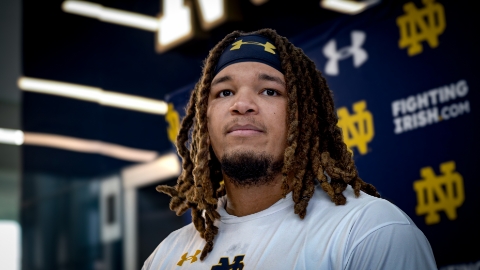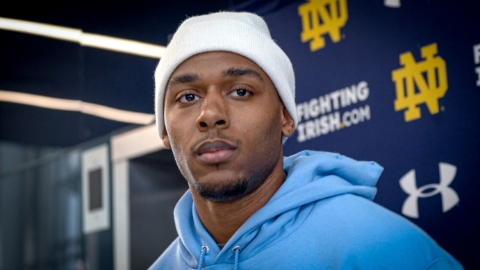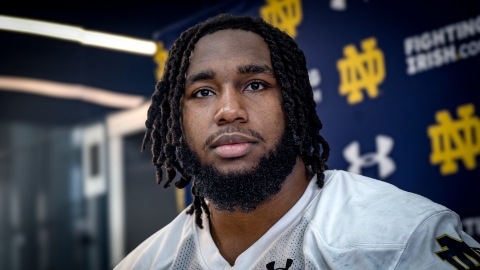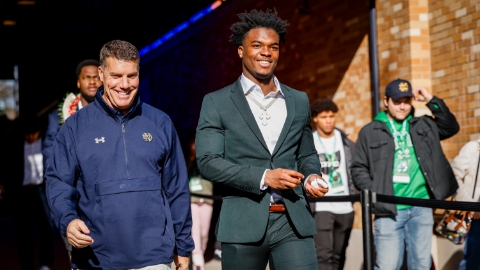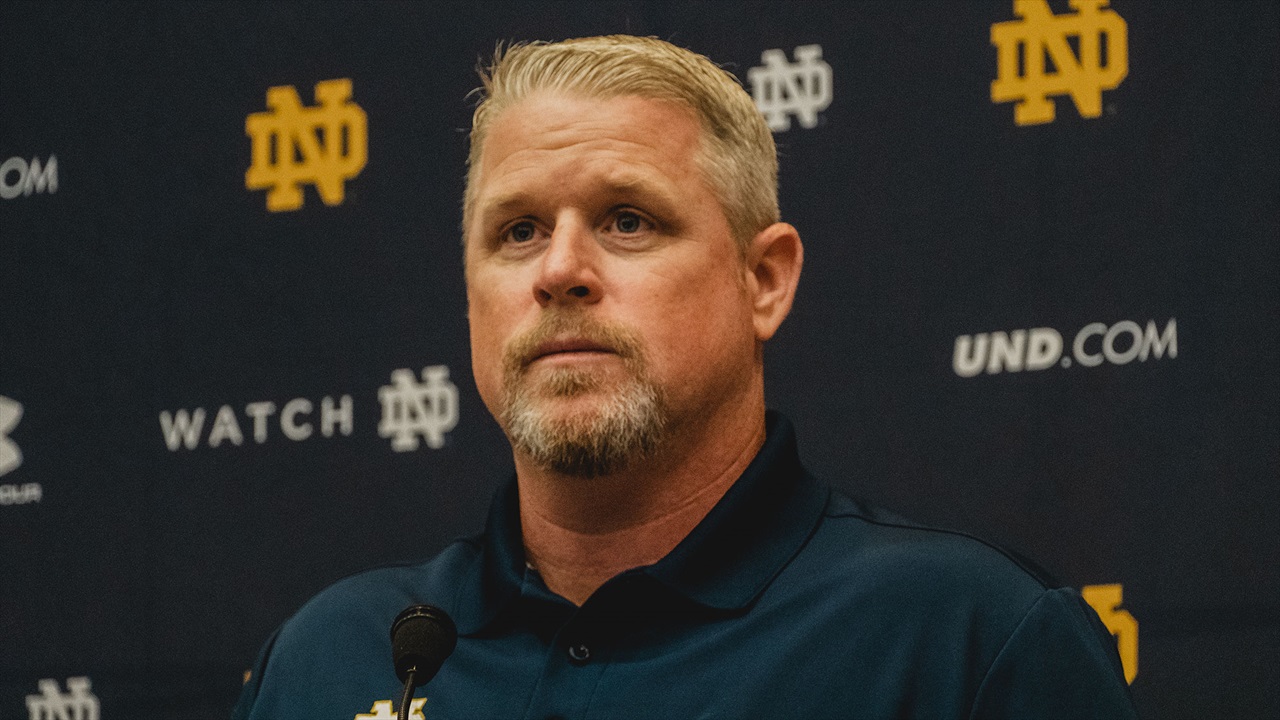
(Check out a special audio version of this story here)
Brian Polian certainly felt a shift in coaching philosophy – heck, he’d been part of such a shift for the past few years himself – but until he found himself in the Office of the Headmaster at Saint John’s High School in Shrewsbury, Mass., on December 12th, 2019, he wasn’t quite able to put his finger on it.
The Notre Dame recruiting coordinator was at the private Catholic, all-boys school along with Irish head coach Brian Kelly wrapping up the recruitment of 2020 wide receiver Jay Brunelle.
During the meeting with Alex Zequeira, Kelly asked the Saint John’s Headmaster if he had any advice he’d be willing to share.
“And, this gentleman looked right at Coach Kelly and said, ‘Here's what I've learned after all these years, you have to honor the relationship before we can ever ask them to honor a task,’” Polian remembers.
“And it was just a sentence that spoke to me. It kind of crystallized a lot of how I was feeling at that time.”
Zequeira says studies over the last 20 years have found boys care more about who is teaching them or who’s coaching them than the actual material.
“They are relational learners, which means that they value the relationship,” Zequeira says. “They want to make sure that the person who's working with them cares about them and if that's evident to them, they will do anything for that teacher or for that coach.
“And so that's really where it comes from. It's this idea of honoring the human being in front of you, honoring what that kid brings to the world and in our case as a Catholic school, the fact that student is a unique expression of God's love. And if we recognize that, the boy will do anything and really work his tail off for you; whether it's academically or on the field.”
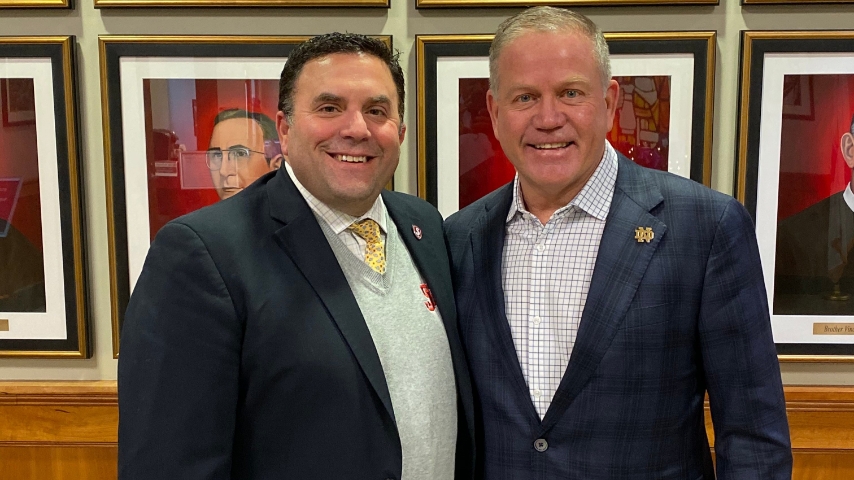
Three years earlier, in December of 2016, following a four-year run as head coach at Nevada, Polian returned to Notre Dame, where he’d spent five years as an assistant during the Charlie Weis Era.
“Our time at Nevada did not end the way I hoped,” Polian says. “In self-reflection, I was looking back and saying, 'What would I have done differently? What could I have done better?'”
As fate would have it, Kelly was undergoing the same sort of self-assessment following a 4-8 season in South Bend, a process that would lead to him making a conscious effort to be more available to his players.
“I watched the way that Coach hit the reset button here at Notre Dame after 2016,” Polian says. “He did such a great job of getting with our players and talking to them and getting feedback. He was building back the culture in the Gug. I was thinking through the experiences in my own career and observing Coach Kelly. I couldn’t articulate clearly what I was feeling about my calling.
“And then that one sentence kind of encapsulated all of it.”
Polian says the relationships coaches build with players are “the single most important thing that we do.”
“In order to be effective in helping them be the best people, best students, best players they can be, we all have to build relationships first, and that's a shift,” Polian continues.
“20 years ago, it was, 'I'm the coach, you're the player. You're going to do this because I asked you to,' and that would be the end of it. And those times have changed.”
Polian knew he wanted to build on the eye-opening moment he’d experienced, but it wasn’t until the pandemic hit that he would have the opportunity to flesh it out.
“All of a sudden, there was time in the calendar that had never existed…in my 24 years of coaching,” he explains. “We're supposed to be practicing spring football, we're supposed to be on the road, spring recruiting, we're supposed to be in summer camps, and we lost all of those things.”
Polian’s wife, Laura, and his father, Bill, encouraged him to fill the time with a major project.
And so, Polian got to work on what would eventually become “Coaching and Teaching Generation Z: Honor the Relationships,” which was released in December and was quickly on back order at Amazon, although it can also be found on CoachesChoice.com.
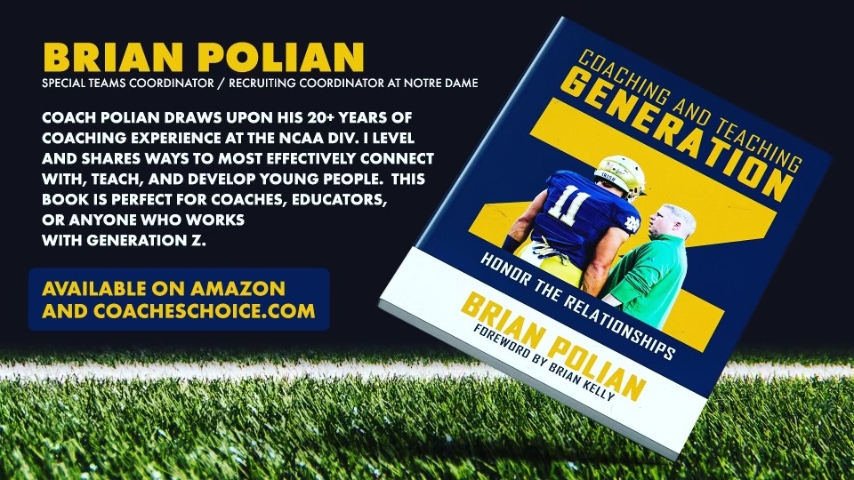
Polian locked in and spent a ton of time researching studies, having conversations with current and former players along with coaches and mentors from a variety of levels and sports. Then, it was time to write.
“It wasn't easy,” he laughs. “I'm not a professional writer, so I imagine it was a little tougher for me than it would be for somebody who does it for a living, but it's certainly something that I enjoyed and would hope to maybe take on again, sometime in my life.
“It was not an overnight thing… But in the end, you're pretty proud of the finished product.”
Zequeira caught up with Polian recently and just received his copy in the mail on Monday. He’s honored to have been such an inspiration.
“I was tremendously humbled to have those words have such a profound impact on him,” he says. “That sort of belief in the relationship, it drives so much of what I do and what I've always done. I started as a classroom teacher and a coach. I coached three seasons for the first 15 years of my career.
“So I know the impact that education, I know the impact that athletics have on our students on young men and young women. So it's deeply humbling and I'm tremendously honored that he would support that same thought.”
“Coaching and Teaching Generation Z” isn’t an X’s & O’s guide. It isn’t a guide to coaching or even a book about sports for that matter.
“The reality of it is, the book's got very little to do with football,” says Polian. “It's got more to do with effectively communicating with young people and helping to develop them.”
Polian notes there’s an entire section on giving and receiving feedback and the best ways to do so effectively.
“That applies to anybody,” he says. “That doesn't have to be a special teams coordinator or a linebacker coach or a wide receiver coach. That's anybody who’s in a position to have to manage people and get a group of individuals pulling in the same direction.”
Polian believes it’s vital to understand the current generation in order to understand how to get through to them.
“Generation Z absolutely wants interpersonal communication, interpersonal relationships,” he says, adding that wasn’t something he was particularly seeking from his coaches when he was playing linebacker at Buffalo’s St. Francis High School or John Carroll University.
The way in which this generation communicates is also different and that’s a factor as well.
“You can have a meaningful conversation and it can be had via text,” says Polian. “That, to me, would have been a crazy thought, but it's not unusual at all to have a very serious…back and forth with a 20-year-old right now through text.
“To them, it’s a daily occurance.”
The days of lectures and repetitive practice schedules are over.
“This generation of young people wants practical teaching that applies directly to them,” says Polian.
“If I've got a linebacker that's not doing a good enough job right now in terms of pass drop angles and vision on receivers, that young man wants individual attention. He wants drills that are going to help him get better at that specific skill.
“There are things that speak directly to our ability to effectively teach Generation Z that are different and there are things frankly, a lot of teachers probably don't think about.”
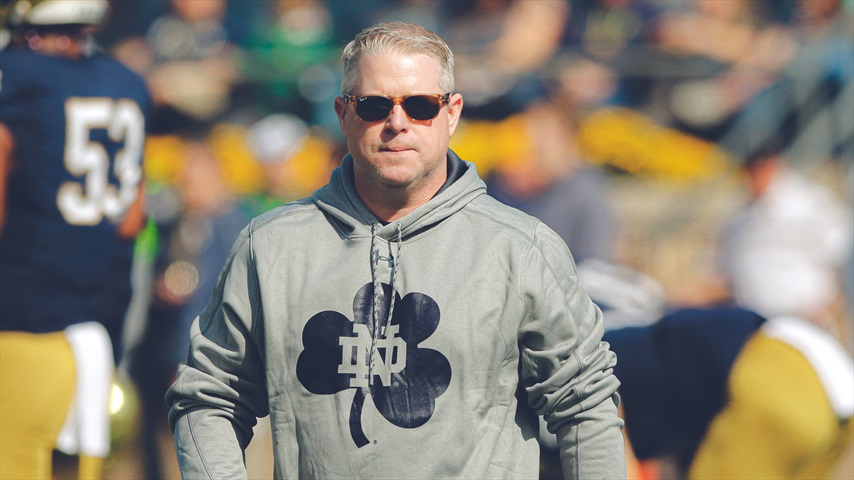
The approach has been even more illuminating off the field.
For years, Polian considered the locker room off limits to himself as a coach.
“That is the players' area, I'm not going to go in there,” he says. “That's their haven.”
But he’s since changed his thinking and 25 minutes prior to the daily special teams meeting, Polian pulls up a chair and just hangs out. Even he’s been struck by seeing the magnitude of his players’ personalities when they’re in their own element.
Former Irish wide receiver Chris Finke is one who stands out.
“Everybody would look at him and say, 'That is a steely-eyed competitor, he's an overachiever. He's such a serious dude,’” says Polian. “And then you would see Chris in the locker room and observe how funny he is and how clever he is and get to enjoy his unbelievable personality.”
Offensive linemen Tommy Kraemer and Robert Hainsey and defensive lineman Ade Ogundeji were among some of the others who caught his attention this year.
“Guys that I wouldn't necessarily get the chance to coach because they're not on special teams other than the field goal unit,” he says.
Polian makes it a point to bring in donuts once a week and has instituted ‘Tell Your Teammate You Love Him Thursday.’
“How many different ways can we keep getting touches?” he says. “Keep building relationships, keep building the culture that Coach Kelly has set in the building and finding those moments and enjoying them.”
Polian says it’s an approach that has been embraced by the entire coaching staff.
“All of our coaches do a great job of building relationships with their position groups, but then to see those things cross over to other parts of the team,” he says. “To watch Tommy Rees work the stretch line and not be standing off to the side, but be walking up and down the rows and talking to guys on the other side of the ball, I think it's just created a really nice atmosphere and it all starts with Coach Kelly.”
That comes as no surprise to Zequeira, who makes it a point to set the expectation every day to the adults at Saint John’s to know, love, value and challenge their students.
“I think if a student feels that they're known, loved and valued and challenged every day, then you've had a successful day with your student,” he says. “Connected to being known, to being loved and to being valued is to be respected in a relationship. So, it all connects. That is a regular thing that I share with our teaching community and with our coaches and our staff.”
Having a front row seat to the changes Kelly made, going through the process of writing the book and hearing from Zequeira that day at Saint John's last winter have fundamentally changed the way Polian will approach coaching for the rest of his career.
“I can only speak for myself, but my heart was kind of going in this direction, I just was not able to put my finger on, 'What am I feeling here and why can't I articulate it more clearly?' And I think this process has allowed me to kind of crystallize all those things.”
